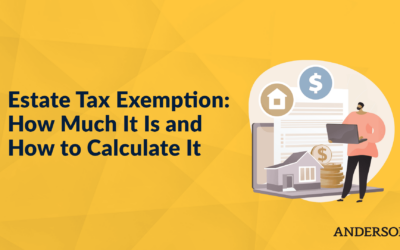Retirement is a milestone most people look forward to during their working years. Estate planning should be one of the first things you do before enjoying your retirement. Planning for retirement involves creating goals, saving for many years, and then determining how to structure your estate and assets.
So before you begin putting your retirement dreams in motion, protect your family by setting up an estate plan that expresses your wishes.
What Is Estate Planning?
Estate planning is the task of determining what will happen to your assets upon your death. Whether you plan to leave your assets to your heirs or donate them to a charity of choice, it’s important to create a plan that accurately expresses those wishes.
An estate plan should also consider debt, taxes, and any other obligations. How you structure your estate can determine how much of your assets your heirs receive and how quickly they receive them. Estate planning aims to create a legal entity that preserves as much of your assets as possible and transfers them to your beneficiaries in the fastest method possible.
Key Takeaways
- The benefits of estate planning for retirees include avoiding probate, protecting assets, minimizing tax liabilities, and protecting your beneficiaries.
- Some of the most common estate planning tools include a last will and testament, a revocable living trust, power of attorney, and life insurance.
- Estate planning helps preserve your wealth, meaning you have more to leave your family.
- Estate planning is especially important if you have legal guardianship of any minor children.
- An asset protection trust can help protect your assets while living and make it easier for your beneficiaries to access them later.
Benefits of Estate Planning
The many benefits of estate planning include:
Avoiding Probate
Depending on your estate planning strategies, your heirs might be able to avoid probate. This is an often time-consuming process of validating a person’s will. Probate also requires the payment of all debt and taxes from any available funds, which can reduce how much your heirs receive. Placing your assets in an asset protection trust when planning for retirement can allow your beneficiaries to skip the probate process.
Tax & Asset Protection Workshop
Learn about Real Estate & Asset Protection at our next
FREE LIVE STREAM
Protecting Assets
Estate planning is a form of asset protection that can help protect your assets from debt or lawsuits in a number of ways. An asset protection trust protects your assets while you’re still living, ensuring there’s more to leave behind. Asset protection trusts transfer to a trust holder, which shields your assets from legal liabilities and creditors.
Estate planning might be especially important if you hold real estate assets. If these assets are in your name, it can be difficult to transfer them to your heirs following your death without the proper paperwork in place.
Minimizing Tax Liability
Estate planning can help minimize tax liabilities. Certain living trusts allow estates to reduce or even eliminate tax liabilities. This means your heirs receive more of the funds you leave them. You can minimize your estate’s tax liability in a number of ways, including gifting assets, making charitable donations, or transferring your assets into a trust.
Estate planning also encourages you to review each of your assets to determine their associated tax liabilities. Tax-deferred assets mean your heirs could owe a significant tax bill upon inheriting your assets unless you account for them now.
Controlling Your Medical Care
Estate planning also determines who makes important medical care decisions if you’re unable to do so. Otherwise, the state is in charge of making these decisions. Including medical care decisions in your estate planning can ensure your wishes are carried out while also reducing family disagreements.
Creating a Legacy
Estate planning allows you to create a legacy. When you take the time to plan ahead, you can maintain control of who gets what. A trust is a legally binding document that ensures your assets go where you want them to.
Estate planning protects your minor beneficiaries by assigning them a guardian or conservator until they reach legal age. Estate planning also removes the chance of family disagreements or disputes over the disbursement of your assets.
Protecting Beneficiaries
Estate planning allows you to assign your beneficiaries and protect them. In addition to assigning who gets what, an estate plan ensures minor children or grandchildren are properly cared for upon your death. An estate plan might be even more beneficial if you have legal guardianship of minor children.
Common Estate Planning Tools
You have many options when it comes to estate planning. Here are some of the most common estate planning tools to consider:
Last Will and Testament
A last will and testament is a legal document that defines who receives which assets. Without a will, your assets might transfer to probate. The state will then review the assets during probate and determine who gets what. This court-supervised process is often timely and can lead to extensive delays when it comes to distributing your assets. Family members and heirs might also disagree on who gets what, which delays the process even more.
A will might also help ensure your other wishes are met, including donating assets to your favorite charity. Your financial needs and goals might change over time, too, making it important to update your will if your family adds new members or if you add or remove assets.
Revocable Living Trust
A revocable living trust is a trust agreement that’s in place while you’re still alive. This type of trust can be changed and updated at any time until your death. Creating a trust transfers the ownership of your assets to another person.
Revocable living trusts offer more guidance on what should happen to your assets than a living will and testament does. A revocable living trust is in contrast to an irrevocable trust, which is a trust that can’t be changed after execution. You can also use a revocable living trust to provide ongoing income or payments to an heir or a charity. A living trust allows you to reduce estate taxes, as well.
Durable Power of Attorney
A durable power of attorney is the person who maintains control of your finances if you become mentally incapacitated. Estate planning should also include assigning a durable power of attorney, which is the task of legally assigning someone the authority to manage your assets and finances once you can no longer do so.
Life Insurance
Life insurance is a great addition to estate planning. Upon your death, your designated beneficiaries will receive tax-free cash. These funds can help them cover the maintenance of your assets, leftover debts, or legal fees associated with estate planning. Life insurance payments can also help your beneficiaries cover unexpected costs.
Estate Planning Is Crucial for Retirees
Regardless of your wealth, estate planning should be part of your retirement plan. Retirees should consider estate planning if they want to protect their assets, determine who gets what upon their death, and help their family members avoid the probate process. Once you complete the important task of estate planning, you can begin to enjoy your hard-earned retirement.
Are you ready to check estate planning off your retirement to-do list? Contact our team at Anderson Advisors today to explore your plans and ensure your assets are protected now and long into your retirement.
Free Strategy Session with an Anderson Advisor
Receive a detailed risk assessment to assist in lowering problem areas that could wipe out all of your assets with one wrong move. Speak with an Anderson Professional Advisor to get your FREE Strategy Session. Limited-Time Offer: FREE (a $750 value.)
















